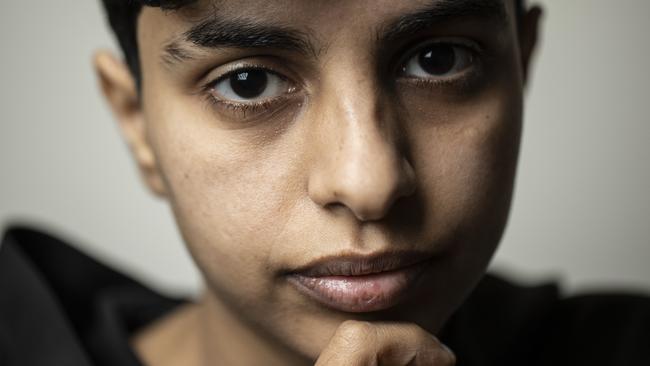The lonely life of intrepid freedom seekers
She survived rape, forced marriage and gay conversion therapy to find a new life in Australia, after fleeing about 12,000km from her home country, Jordan.

She survived rape, forced marriage and gay conversion therapy to find a new life in Australia, after fleeing about 12,000km from her home country, Jordan, where she was known as Alshaima Alzubi.
Now Luce (not her legal name) has a freedom that she did not have with her family in Jordan, where homosexuality is legal but it is taboo in many families, public discussion of LGBTI rights has been censored, and public same-sex displays of affections can be chargeable offences.
But it’s a lonely life for the 26-year-old, marred by fears that her relatives will find her and force her to return to them and the man she was made to marry.
Luce, who suffers from post traumatic stress disorder, said her family beat her if she did not submit sexually to her husband, who is also her cousin.
“You have to prepare yourself each night to be raped, otherwise there’s going to be a complaint to your family – your family is going to hit you,” Luce said.
Luce, who identifies as non-binary, is one of countless people who have sought refuge in Australia but remain haunted by fears they will be forced to return to their home countries.
The situations of people who have fled conservative Middle Eastern countries was exposed in recent weeks by the deaths of two Saudi sisters, whose bodies were found in June in an apartment in Sydney’s inner-west Canterbury.
Both had applied for protection visas. One, understood to be 23-year-old Amaal Abdullah Alsehli, applied for the visa on the basis she was a lesbian. The other, understood to be 24-year-old Asra Abdullah Alsehli, applied on the grounds she was an atheist.
Their deaths sent ripples of fear through communities of former Muslims and escapees from oppressive societies.
NSW police reportedly believe the deaths were a suicide pact; the state coroner is preparing a report.
Luce was granted a refugee and humanitarian visa – subclass 202 – as part of Australia’s special humanitarian program and allows her to tell her story.
The visa is given to people subjected to substantial discrimination in their home country. Many others are not as lucky and remain voiceless as they wait in limbo for decisions on visas or remain stranded in oppressive societies.
Luce did not know the Saudi sisters but understands how they lived and how they feared their family, as they tried to embrace freedom in Australia.
“I related to them (sisters) and thought about how they died,” Luce said. “Being lonely for five years in Australia with no protection, no support system. I believe they tried but they ended up dead.”
The first time Luce escaped Jordan, she made it to California in 2019. She’d met a girl on a dating app and went to live with her.
For a while, the couple was happy but then Luce’s family found them and started threatening her girlfriend and her girlfriend’s children. Eventually, in a bid to protect her girlfriend, Luce moved into a shelter before returning to Jordan in March 2020.
When she arrived, her family seized her passport before institutionalising her to undergo gay-conversion therapy.
After a few weeks, she was released from the institution but imprisoned inside the family home for months as her family searched for a groom, settling on her cousin. It was about a month before Luce managed to escape, steal back her passport and flee to Turkey then Lebanon. He followed her, reporting her missing in Turkey and telling Lebanese authorities she was mentally unwell.
The then 25-year-old was detained, put on a no-fly list and faced forced repatriation to Jordan, but Secular Rescue, which helps people flee persecution, with assistance from Amnesty International, assisted Luce and she was eventually allowed to board a flight to Australia.
She is one of the luckier ones.
Academic and author Kylie Moore-Gilbert, who spent more than 800 days in Iran’s Evin prison, said Australia needed to prioritise women fleeing war zones or failed states who also faced gender-based violence or persecution.
“There’s all sorts of gender-based risks that women in temporary camps or holding facilities waiting for resettlement face that men don’t have to deal with,” she said.
Dr Moore-Gilbert said there was a reluctance among the political and media classes to criticise Islam for fear of being branded Islamophobic.
“I do think we need to recognise that in most Muslim countries women are treated less respectfully than men and not as equals to men,” she said, stressing that she was commenting on extreme elements of Islam.
“That extends to children and child custody arrangements and rights of divorce and escaping family violence.”
Luce is happier in Australia – she has a support network, a therapist and a general practitioner – but remains haunted by memories of her family’s treatment of her back in Jordan.
“To be honest, with the trauma and the fear, it’s not easy to go on and live your life,” she said.
“I keep receiving threats and I’m struggling mentally and physically but at least I found support.”
After the two Saudi sisters died, Luce received messages on TikTok that said “You’re next”.
She said she was alarmed by reports the bodies of the sisters had been repatriated to Saudi Arabia. If she died in Australia, she said, she did not want her family to get her body.
If you or someone you know is at risk of suicide, call Lifeline (13 11 14) or the Suicide Call Back Service (1300 659 467), or see a doctor.



To join the conversation, please log in. Don't have an account? Register
Join the conversation, you are commenting as Logout